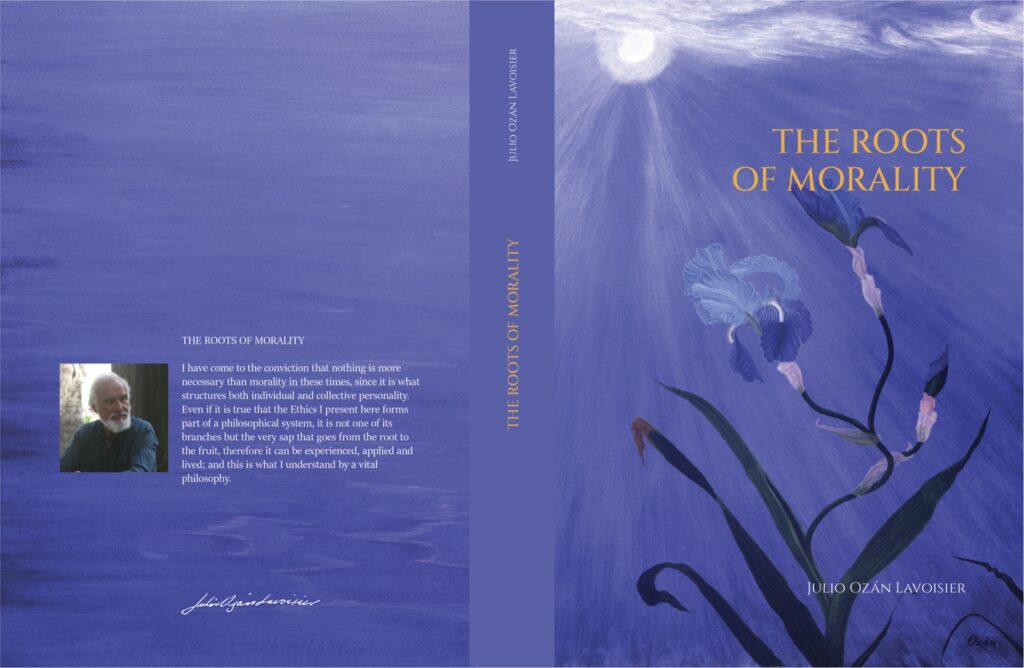The mechanical ritual is like a useless bureaucracy; without the spirit is like moving mummies.
Inicio » THE ROOTS OF MORALITY
THE ROOTS OF MORALITY
English – Spanish.
I have come to the conviction that nothing is more necessary than morality in these times, since it is what structures both individual and collective personality. Even if it is true that the Ethics I present here forms part of a philosophical system, it is not one of its branches but the very sap that goes from the root to the fruit, therefore it can be experienced, applied and lived; and this is what I understand by a vital philosophy. I do not believe in theories nor in people who do not base themselves on a moral life; the real in human beings is the moral, not the rational. This system, then, is fed by this spiritual sap, as I am convinced that philosophies without spirit do not bear fruit, and, like trees without sap, they become sterile and lifeless, however great and imposing they may be. We will deal with two aspects or basic stages of this morality here: first, the flow of that sap, second, the path that leads us to its roots; we cannot arrive at the second without being conscious of the first. Our vigilance should be as constant as this flow, and this means refracting all our thoughts and actions in moral consciousness; self-knowledge fundamentally resides in this vigilance. Then, and only then, can we undertake the second stage, the knowledge of the roots of morality.
Morality is a science of the spirit that has a practical, utilitarian and external sense, and an internal sense that concerns only consciousness. The first has as its objective the harmonious relationship with other beings and the world, the second is destined to find the origin and very essence of morality, that is, of consciousness. If this knowledge and destiny are not reached, practical morality will always have shortcomings and will be enmeshed in selfish uses; it is what happens in the great majority of human beings and by extension in societies; hence the differences, disagreements, conflicts, wars, etc., which as we know have been and are a daily part of human endeavor.
Throughout my work I have insisted on the need to complement the path towards the Transcendent with spiritual techniques. But they do not go beyond being accessories, while knowledge of moral consciousness is the tool and the driving force of that objective, it is the indispensable reference to order and direct these techniques. In fact, no meditation, contemplation or exercise can lead to this objective if all the accounts are not settled in the moral consciousness; all of them, I repeat, from our childish pranks to the petty lies for personal benefit (there are also occasions when lying is healthy for consciousness). Moral consciousness, in short, is the filter and the door through which all aspirants to the Transcendent should pass.

Index
- Introduction
- Ethics and Psychosophy
- Premises of the Method
PART ONE
- Ethics in Persia
- Ethics in China
- Taoism
- Confucianism
- Confucius
- The I Ching
- Ethics in India
- Greek Ethics
- The Pre-Socratic’s
- Socrates
- Plato
- Aristotle
- Equilibrium and Other Greek Virtues
- On Greek Moral Consciousness
- The Law and Politics
- The Moral Cyclical Vision of History
- Pericles, and Example of Illustrious Ruler
- Epicurus
- Roman Ethics
- Seneca, on Clemency
- Plotinus
PART TWO: Morality in Christianity
- The Bible
- The Genesis of Christian Morality
- Jesus and the Pharisees
- Paulist Doctrine
- Ecclesiastical Politics
- Some Church Patriarchs
- Christian Morality
- Two Platonic Christians
- On Happiness
- On the Individual Soul
PART THREE: Ethics in the Renaissance, the Enlightenment and Romanticism
- A moral Prototype
- On Individualism
- Morality Revived
- The Virtues of Patronage
- The Enlightenment
- Voltaire
- Voltaire and the Revolution
- What is the Enlightenment?
- Kant
- Kant’s Morals
- Freedom
- Immortality
- Kant’s God
- Man as the Final Cause
- Commentary
- Fichte
- Of Transcendental Intuitions
- On the Goodness of Man
- Rousseau
- Schiller
- A New Ethics in America
- Questioning Inherited Morals
- Nietzsche and Christian morality
- The Anti-Christ
- Nietzsche’s Successes and Failures
- Nietzsche, Schopenhauer and Asceticism
- Nietzsche, Schopenhauer and the Will to Power
PART FOUR: Morality and Society
- Of the Noble and Vulgar Spirit
- Christian Morality Today
- Marxist Morality
- The Hellenic Proposal
- Contemporary or Mass Morality
- On the Evolution of the Spirit
- Moral Education
- Social Consciousness
- Three Postures vis-à-vis an Example
- Mimesis and Democracy
- Ideologies of Violence
- The Stage of Necessity
- Overpopulation is an Excess
- A Process of Alienation, Externalisation and Consumption
- Moral Politics
- The Enlightened Ruler
- The Republic and Democracy
- On the Inversion of Culture and its Consequences
- Meritocracy
- Essence and Existence
PART FIVE: My Project: The Ascension of the Spirit and Moral Consciousness
- The Need for Moral
- On Evolution and Moral Stagnation
- Of Good and Evil
- The Concept of Human
- The Two Consciousness of Man
- On Original Unity
- The One and the Unity
- The Ethical Path (of Psychosophy)
- The Transcendental Function of Morality
- Unitive Memory and Collective Unconscious (of Psychosophy)
- The Moral Conscience is Unitive
- Unitive Perspective of Morality
- Unitive Faculties
- Of Vices and Virtues
- Sympathy and Antipathy
- Incipient Reason
- Why No one is a Prophet in his Own Land
- Spontaneity
- Prudence
- On the Relation on Love
- Love
- On Pleasure and Happiness
- Freedom and Happiness
- Moral Idealism
- God as Consciousness
- Synthesis of my Ethics
- Brief Moral Cosmology
- The Creative
EPILOGUE
- An Overview of my Life
- Maxims and Paradoxes

